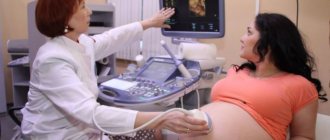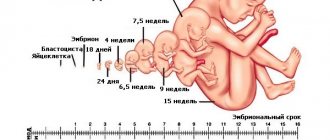A screening ultrasound in the second trimester is performed to assess the dynamics of fetal development, as well as the condition of the placenta and amniotic fluid. The study will allow you to detect most pathologies in time and take action. This is a planned diagnostic procedure that is important for every pregnant woman after 18 weeks of gestation.
At the Alfa Health Center in Moscow, expert-class equipment is used for ultrasound. Thanks to the high accuracy of the image, the doctor can notice the slightest deviations from the norm in time.
Why do an ultrasound in the second trimester of pregnancy?
Ultrasound for pregnant women is performed transabdominally and transvaginally - superficially through the abdomen or by inserting a sensor into the vagina. Using ultrasound, the gynecologist determines:
- fetal heart rate,
- indicators of the development of body parts and internal organs,
- position,
- presentation and degree of maturity of the placenta,
- volume and quality of amniotic fluid,
- umbilical cord condition,
- uterine tone,
- possible pathologies of the mother's reproductive system.
The purpose of an ultrasound in the second trimester is to make sure that the pregnancy is progressing normally and that nothing threatens the mother and baby. If any deviations from the norm are discovered, the doctor will be able to order additional tests and, based on their results, prescribe the necessary treatment.
What does a routine ultrasound show in the second trimester?
The obstetrician-gynecologist who is managing the pregnancy will recommend an ultrasound of the second trimester at 18-21 weeks.
The study provides reliable information about:
- Fruit size;
- The amount of amniotic fluid;
- The condition and position of the placenta, umbilical cord;
- The presence of developmental defects;
- The shape and size of the skull, the condition of the spine, soft tissues, and limbs of the fetus;
- Development of internal organs.
It is the second screening ultrasound that makes it possible to determine the sex of the baby with a high degree of probability.
Norms of indicators in the ultrasound protocol in the 2nd trimester of pregnancy
BDP or biparietal size is the distance between the temporal lobes of the fetus, by which the doctor can judge its development and determine the exact duration of pregnancy. The norm for BPR at week 20 is 43–53 mm.
LZR or fronto-occipital size is the distance between the occipital and frontal bones. At the second screening, this figure should be within 56–68 mm. Deviation of the BDP or LZR to a lesser extent indicates a possible intrauterine developmental delay.
EG and coolant - the circumference of the child’s head and abdomen. By mid-pregnancy, fetal OG and coolant are usually 164–186 mm. Exceeding the norm of OG is one of the primary symptoms of hydrocephalus; values below the norm, again, indicate a developmental delay.
Bone lengths are measured to rule out the presence of genetic diseases, such as Cornelia de Lange or Patau syndrome. In the ultrasound protocol the lengths are recorded:
- femoral bones (FB);
- lower leg (DKG);
- forearms (DKP);
- shoulder (humeral)
- nasal (DNA).
It is important to note that bone lengths do not always indicate underdevelopment or abnormal development. These indicators are strongly influenced by heredity, therefore, if they diverge from the norm, the gynecologist always prescribes a clarifying biochemical blood test. The blood is checked for biochemistry, the level of hCG, alpha-fetoprotein, and estriol is calculated.
AFI or amniotic fluid index is a coefficient indicator of the quality and quantity of amniotic fluid. In case of oligohydramnios - when the AFI is less than 2 cm - the woman is admitted to the department for preservation and treatment is urgently started to preserve the pregnancy.
The length and patency of the cervix is an important indicator of the absence of isthmic-cervical insufficiency and other problems that threaten the health of the mother and child.
Presentation, maturity and thickness of the placenta. During the normal course of pregnancy, the placental sac is located in the posterior wall of the uterus; its attachment to the anterior wall or prolapse - below 5.5 mm from the internal os - is considered an indication for a cesarean section. The normal thickness of the placenta at week 20 is 16.7-28.6 mm. Thickening often indicates Rh conflict, gestosis and a number of other diseases that require immediate treatment. The maturity of the child's place, in turn, in the second trimester of pregnancy should be zero; a mark of the first degree indicates its aging, which is fraught with premature birth.
In addition to diagnostics and monitoring, ultrasound from 14 to 27 weeks of pregnancy is an opportunity to find out the sex of the child, see and even print his ultrasound photograph as a souvenir.
Benefits of Ultrasound for Pregnancy Monitoring
Ultrasound is chosen as the main screening method because ultrasound is the safest and most convenient during pregnancy.
What are its advantages:
- Ultrasound is highly accurate and quite informative, especially if performed using sensitive modern equipment;
- This is a painless and comfortable procedure for women, which takes a few minutes;
- Ultrasound waves do not affect the health of the mother and unborn child, the study is absolutely safe;
- Ultrasound has no contraindications and is performed during any course of pregnancy and at any stage.
Sign up for an ultrasound in the 2nd trimester of pregnancy
In our medical center, ultrasound examinations of pregnant women are performed by gynecologists with qualifications as ultrasound diagnostic doctors. The procedure takes place in comfortable conditions: the office is warm, soft couches are covered with disposable sheets, you don’t need to take anything with you - we’ll give you everything you need.
To make an appointment for an ultrasound in Khimki, call. We work from 8.00 to 21.00, during non-working hours you can leave a request for an appointment in Telegram or WhatsApp at +7 (929) 912-22-76. The medical center administrator will call you back during business hours.
How is ultrasound performed?
Ultrasound of the second trimester of pregnancy is performed transabdominally, as a routine examination of internal organs. In the office, you will be asked to lie down on the couch and lift up your clothes. Then the doctor will apply a special conductive gel to the skin of the abdomen and move the sensor to view the fetus in different projections. The image is displayed on the screen in real time.
No special preparation is required for the study. So that the doctor can evaluate the development of the fetus over time, it is better to take with you the results of the previous screening ultrasound (in the first trimester).
Where to do an ultrasound during pregnancy?
Today, many women prefer to have ultrasound scans during pregnancy in private medical centers with high-quality equipment, highly qualified specialists and a pleasant attitude. And you can make an appointment at any clinic in Moscow using the “Your Doctor” service.
Useful information on the topic of gynecologist:
- How to get tested for gynecological diseases?
- What diseases does a gynecologist treat?
- What tests can be done by a gynecologist?
- How to prepare for an appointment with a gynecologist?
- Where to go with a gynecological problem?
- What symptoms should you consult a gynecologist for?
- How does an appointment with a gynecologist go?
- Female doctor
- Diagnosis of sexually transmitted infections in women
- Diagnosis of gynecological diseases
- Treatment of female diseases
- Pediatric gynecologist
- How is a gynecologist examined?
- Paid gynecologist
This article is posted for educational purposes only and does not constitute scientific material or professional medical advice.
Author:
Kasabov Alexander Vladimirovich Urologist, Candidate of Medical Sciences, Ultrasound Doctor
Back to section
Preparing for the second pregnancy screening
Ultrasound examination does not require any special preparation. But if the expectant mother is going to donate blood immediately after it, then the ultrasound should be performed on an empty stomach. Another option is to space the screenings on different days. Another recommendation to patients from our obstetricians-gynecologists is to come for examination with a positive attitude and rested.
Don't be afraid of prenatal screening. Most likely, he will show that everything is fine with the baby. If deviations are identified, this will allow the necessary measures to be taken in a timely manner - for example, to maintain the pregnancy or to properly prepare for the fight for the baby’s health.
You can sign up for an examination by phone, through a form on the website or online chat.
Screening results
The day before the test, it is important to adhere to a diet avoiding foods that increase gas formation, as well as fried, spicy and smoked foods. Bladder fullness is not a prerequisite for an ultrasound scan in the second trimester of pregnancy. This function is taken over by the growing uterus and amniotic fluid, so preparation for screening is not difficult.
An ultrasound scan in the 2nd trimester of pregnancy is necessary for the timely detection of such anomalies as:
- acrania or anencephaly;
- hydrocephalus;
- cranial hernia;
- malformations of internal organs;
- spinal cord developmental disorders, etc.
At this stage, ultrasound examination will help to reliably detect heart defects, cleft lip, abnormalities of the limbs and many other defects. High accuracy allows you to obtain reliable information about the development of a child, assess in detail the rate of his growth, and ensure the absence of defects. In addition, it is at this time that there is a reliable opportunity to find out the gender of the baby.
If possible complications are identified, the doctor will definitely explain the prospects and options for the development of events, help you make the right decisions and prescribe additional studies according to indications. This will help reduce the likelihood of an unfavorable outcome and maintain the health of the expectant mother.
Indications for the study
Ultrasound screening of the 2nd trimester is indicated for all pregnant women without exception, but it is especially important to undergo it on time if there is one or more indications:
- The age of the expectant mother is from 35 years.
- Questionable first trimester screening results.
- Aggravated obstetric history: miscarriages and terminations of pregnancy, premature birth, intrauterine fetal death, birth of children with congenital defects, etc.
- Previously born children with developmental anomalies, chromosomal abnormalities.
- Exposure to radiation in the first trimester.
- Taking medications contraindicated during pregnancy.
- Past viral, fungal, bacterial infections.
- Consanguinity of the parents of the future baby.
.Preparation
Try to exclude nuts, chocolate and cocoa, seafood, fried and fatty foods from your diet the day before screening. 6 hours before the test, you need to refrain from eating and drink only still water.
Before the ultrasound, you do not need to specifically fill your bladder; you do not need to take anti-gas medications. The growing uterus moves the intestines to the back wall, and amniotic fluid allows ultrasound waves to pass freely (instead of a full bladder).
Ultrasound examination
Ultrasound allows you to diagnose a wide range of intrauterine anomalies:
- anencephaly – a malformation of the brain;
- acrania – absence of the cranial vault, soft tissues of the head, pathological changes in the brain;
- hydrocephalus;
- cranial hernia;
- structural disorders of the spinal cord;
- malformations of internal organs.
Biochemical research
During screening in the 2nd trimester, based on the results of a biochemical blood test, a computer calculation of the probability of chromosomal abnormalities is performed. To do this, the concentration of the following hormones is determined:
1. Human chorionic gonadotropin. Its concentration peaks at the end of the first trimester. It is produced by the placenta and plays a key role in maintaining its functional activity. The normal level of human chorionic gonadotropin in the second trimester does not exceed 103,000 mU/ml.
2. Alpha fetoprotein. Produced by the digestive tract and liver of the fetus. It prevents immune conflict between mother and unborn child. A decrease in the level of alpha-fetoprotein in the blood may be a marker of fetal chromosomal pathology.
3. Free estriol. The concentration of this hormone increases with the development of the placenta, reaching a maximum in the third trimester of pregnancy. It increases blood supply to the uterus and promotes the formation of the mother's mammary gland duct system.
Important: if screening in the 2nd trimester of pregnancy reveals the likelihood of complications, the doctors of the Family Doctor clinics will talk in detail about all possible options for the development of the situation,, if necessary, prescribe additional studies, propose a treatment regimen in order to minimize the risks of an unfavorable outcome and increase the chance of preserving the health of the expectant mother and a child. The main thing is not to be nervous. Your peace of mind and the care of specialists is the best thing you can do for yourself and your baby.
Who is screening indicated for?
Perinatal screening in the 2nd trimester is recommended for all pregnant women. It is recommended to undergo research:
- women over 35 years old;
- pregnant women with a history of premature birth or miscarriages;
- in the presence of children with developmental anomalies;
- if in the first trimester the woman’s body was exposed to radiation;
- expectant mothers who take or have taken drugs during pregnancy that are prohibited during this period, have had viral or bacterial diseases;
- if parents are consanguineous








